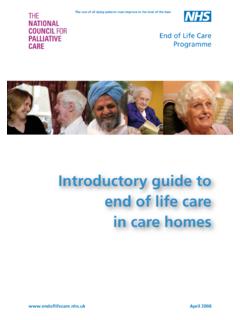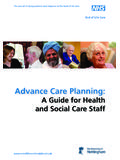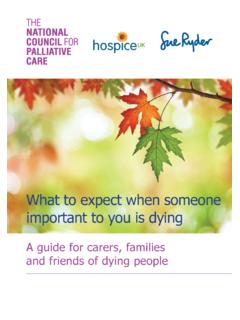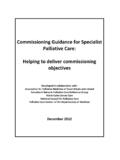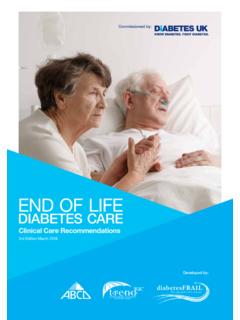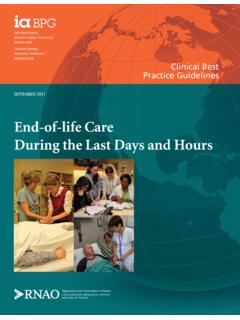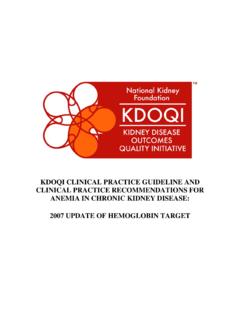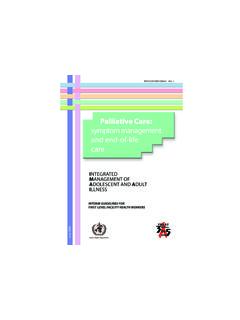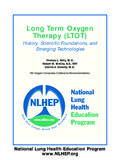Transcription of to avoid - NCPC
1 Initial actions for new commissionersCommissioning End of life CareJune 2011to avoidaecat&rlyContentsAssessment & MeasurementIntroductionWho, What, Why?Acknowledgements and supportEducationCommunication & Co-ordinationAcute careTransitionsRealigning resourcesLife choicesYour checklist of resourcesWho else? National Council for Palliative CareThe National Council for Palliative Care (NCPC) is the umbrella charity for all those who are involved in providing, commissioning and using palliative care and hospice services in England, Wales & Northern Ireland. NCPC promotes the extension and improvement of palliative care services for all people with life threatening and life -limiting conditions. NCPC promotes palliative care in health and social care settings across all sectors to government, national and local policy makers.
2 For further information or to subscribe to NCPC to receive publications free of charge and reduced rates at conferences visit MattersDying Matters is a broad based and inclusive national coalition set up by the National Council for Palliative Care and is supported by the Department of Health. It aims to engage thousands of organisations across a range of sectors, generating, leading and supporting collective action to promote public awareness and debate on issues of death, dying and bereavement in National End of life Care ProgrammeThe National End of life Care Programme works with the health and social care workforce across all sectors in England to improve end of life care for adults, supporting the implementation of the Department of Health s End of life Care National End of life Care Programme aims to.
3 L Promote high quality, person-centred care for all adults at the end of life in all care settingsl Enable more people nearing the end of life to choose where they live and National End of life Care Intelligence Network The National End of life Care Intelligence Network which is part of the The National End of life Care Programme aims to improve the collection and analysis of information about end of life care services provided by the NHS, social services and the third sector. Areas of research include quality, volume and costs of care provided to adults approaching the end of life . This intelligence will help drive improvements in the quality and productivity of the purposes of this guidance people are approaching the end of life when they are likely to die within the next 12 months.
4 This includes people whose death is imminent (expected within a few hours or days) and those with:(a) advanced, progressive, incurable conditions(b) general frailty and co-existing conditions that mean they are expected to die within 12 months(c) existing conditions if they are at risk of dying from a sudden acute crisis in their condition(d) life -threatening acute conditions caused by sudden catastrophic Working Definition of End of life Care End of life care is care that: Helps all those with advanced, progressive, incurable illness to live as well as possible until they die. It enables the supportive and palliative care needs of both patient and family to be identified and met throughout the last phase of life and into bereavement. It includes management of pain and other symptoms and provision of psychological, social, spiritual and practical support.
5 Introduction: why act&earlyAdapted from Treatment and care towards the end of life : good practice in decision making, the General Medical Council 2010 Source: National Council for Palliative Care 2006 The End of life Care Strategy 200841 4 avoidFor some people the appropriate start for end of life care might be at the time of diagnosis of a condition which usually carries a poor prognosis, for example motor neurone disease or advanced liver of life care is a national priority, following the End of life Care Strategy1. It is one of the DH s Quality Innovation Productivity & Prevention (QIPP) priority areas and is included in the NHS Operating Framework for 2011/12. There has been some excellent progress made at local level over recent years but considerable variation in quality and efficiency remains across the country.
6 Aspects of end of life care are provided across the health and social care economy. District nurses, GPs and care assistants are fundamental to generalist palliative and end of life care needed by the majority of people at some stage. People may also receive elements of end of life care from their specialist community and secondary care teams, such as symptom management. A smaller proportion of people will need direct access to specialist palliative care teams. These might be based in a hospital, a hospice or the community. The majority of specialist palliative care services are managed by voluntary sector organisations, not the NHS, and their commissioning arrangements with the NHS have traditionally varied substantially. Hospices and other specialist palliative care providers, however, are vital not only to the care of people with complex needs but also to training and developing the wider workforce and providing access to specialist advice and support to other professionals.
7 The purpose of this briefing is to help you to identify the immediate priority actions to commission effective end of life care, focusing on steps which we believe will make the most difference initially and can be seen as quick wins . Why?The next two years provide a unique opportunity for new commissioning organisations to position themselves in the best clinical and financial position before they begin business as legal entities, for some at least as early as April 2013. By targeting end of life care, emergent commissioners can place themselves in a strong position for one of the major required areas of improving quality and safety of care; improving patient and carer experience and making care more cost/resource efficient. Tackling end of life care early can offer a number of significant quick wins in improving the quality of care in your locality.
8 People should be supported to be cared for and to die in their preferred place of care, which is usually their home End of life Care Strategy 20081. It may also include other community based settings such as a care home or sheltered housing. This means commissioners should ensure there is planned 24/7 provision of community support, including care co-ordination, nursing and symptom control. In contrast, poor end of life care is rushed and unplanned often resulting in unnecessary, and expensive trips to Accident and Emergency with crisis admissions to hospital. These are distressing not only to individuals but can have a detrimental effect on those who have been bereaved. 5 There is considerable scope for improvement using interventions such as early identification triggers, advance care planning, co-ordination of care and effective multi disciplinary team (MDT) workingEnd of life care accounts for a high proportion of NHS spending.
9 The Demos2 think tank has estimated it as at least a fifth of NHS costs and a total of about 20 billionThe National Audit Office3 (NAO) found that 40% of end of life care patients had no medical need to be in hospital In the same report, the NAO found wide variations in end of life care provision across England. Spending by PCTs varied from 154 to over 1,600 per personThe King s Fund4 has identified improving primary care management of end of life care as one of the top 10 priorities for commissioners6 Assessment and measurement for end of life care commissioning must reflect the whole population s needs across the end of life care pathway. commissioning services to meet people s end of life care needs will require linking with planning for areas such as long term conditions care, care of the elderly, dementia care and carers support.
10 On average, 1% of people (20 people) on a GP s list, will die each year. Every practice should be encouraged to have an up to date and reviewed End of life Care register. However, not everyone needing end of life care will be on an end of life care register. End of life care should be a significant aspect of the local Joint Strategic Needs Assessment (JSNA) process and population needs assessment should draw on data from health, social care, public health and housing, including the National End of life Care Intelligence Network1. Monitoring for quality outcomes will be core to measuring service delivery. As part of the commissioning cycle, assessment and measurement should be combined with audit and review, including information gathered in organisations Quality Accounts.

